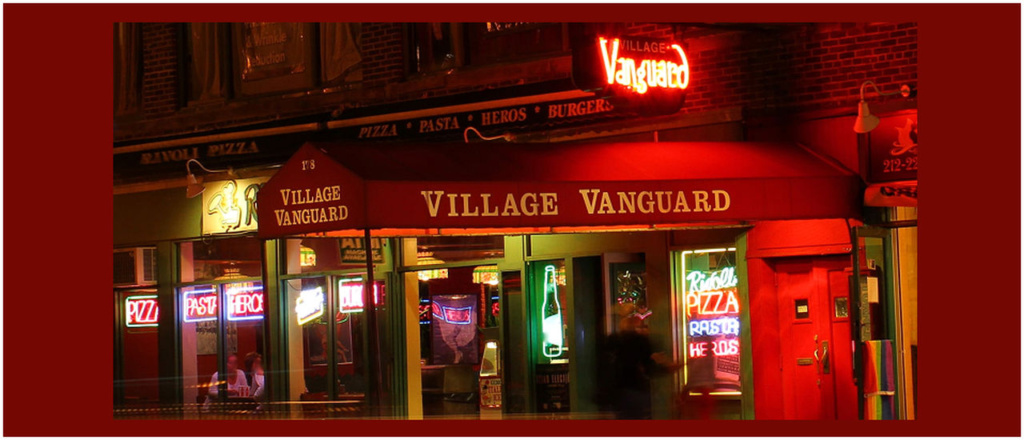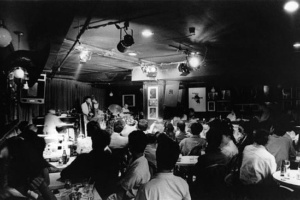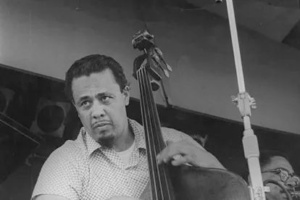KUVO’s Kaleidoscope of Sound takes you to New You All Day!
With each turn, the kaleidoscope transforms us with a variety of sounds! We thank you for joining us on a journey to New York. Behind the scenes here at KUVO JAZZ, on the air, online, and in the community, the music is possible and powerful because of your support!
VILLAGE VANGUARD
 New York jazz fans learn early in their initiation about the 123-person-capacity Greenwich Village basement known as the Village Vanguard. It’s the most famous venue in the history of music — the one that’s hosted the most live recordings, booked the greatest musicians, and, more than any other room (and in its very name), embodied the creative tension between history and innovation that sparks the best jazz. Looking back at some of the moments that have defined its history, from the discovery of a space with “two johns, two exits,” and a distance “two hundred feet away from a church or synagogue or school,” to the legendary (and sometimes violent) performances of Sonny Rollins, Bill Evans, and Charles Mingus that spread its sound across the globe.
New York jazz fans learn early in their initiation about the 123-person-capacity Greenwich Village basement known as the Village Vanguard. It’s the most famous venue in the history of music — the one that’s hosted the most live recordings, booked the greatest musicians, and, more than any other room (and in its very name), embodied the creative tension between history and innovation that sparks the best jazz. Looking back at some of the moments that have defined its history, from the discovery of a space with “two johns, two exits,” and a distance “two hundred feet away from a church or synagogue or school,” to the legendary (and sometimes violent) performances of Sonny Rollins, Bill Evans, and Charles Mingus that spread its sound across the globe.
 After running the Vanguard for a year as an unlicensed poets’ hangout on Charles Street, Max Gordon, the club’s founder, decides to go legit. “I knew if I was ever to get anywhere in the nightclub business, I’d have to find another place with two johns, two exits, two hundred feet away from a church or synagogue or school,” he recalls in his memoir, Live at the Village Vanguard. After closing the Charles Street club on a Thursday night, he hauls five truckloads of wooden barrels, benches, and an upright piano to the Vanguard’s current location in the basement space of 178 Seventh Avenue South. He opened for business the very next day.
After running the Vanguard for a year as an unlicensed poets’ hangout on Charles Street, Max Gordon, the club’s founder, decides to go legit. “I knew if I was ever to get anywhere in the nightclub business, I’d have to find another place with two johns, two exits, two hundred feet away from a church or synagogue or school,” he recalls in his memoir, Live at the Village Vanguard. After closing the Charles Street club on a Thursday night, he hauls five truckloads of wooden barrels, benches, and an upright piano to the Vanguard’s current location in the basement space of 178 Seventh Avenue South. He opened for business the very next day.
 Incendiary bassist Charles Mingus inflicted more damage on the Vanguard than any other artist. He once held a knife to Max Gordon’s throat for supposedly underpaying him, tore the Vanguard’s front door off its hinges because Gordon forgot to write “Jazz Workshop” after Mingus’s name, and smashed a ceiling light with the head of his bass after becoming angry with an audience member. Gordon never replaced the light and, to this day, it remains broken. Mingus, 1960.
Incendiary bassist Charles Mingus inflicted more damage on the Vanguard than any other artist. He once held a knife to Max Gordon’s throat for supposedly underpaying him, tore the Vanguard’s front door off its hinges because Gordon forgot to write “Jazz Workshop” after Mingus’s name, and smashed a ceiling light with the head of his bass after becoming angry with an audience member. Gordon never replaced the light and, to this day, it remains broken. Mingus, 1960.
Source: VULTURE — A Brief and Colorful History of the Village Vanguard by Eric Benson
Stay connected to KUVO’s programs and our community! Sign up for the Oasis E-News today!
Become a Member
Join the growing family of people who believe that music is essential to our community. Your donation supports the work we do, the programs you count on, and the events you enjoy.
Download the App
Download KUVO's FREE app today! The KUVO Public Radio App allows you to take KUVO's music and news with you anywhere, anytime!


